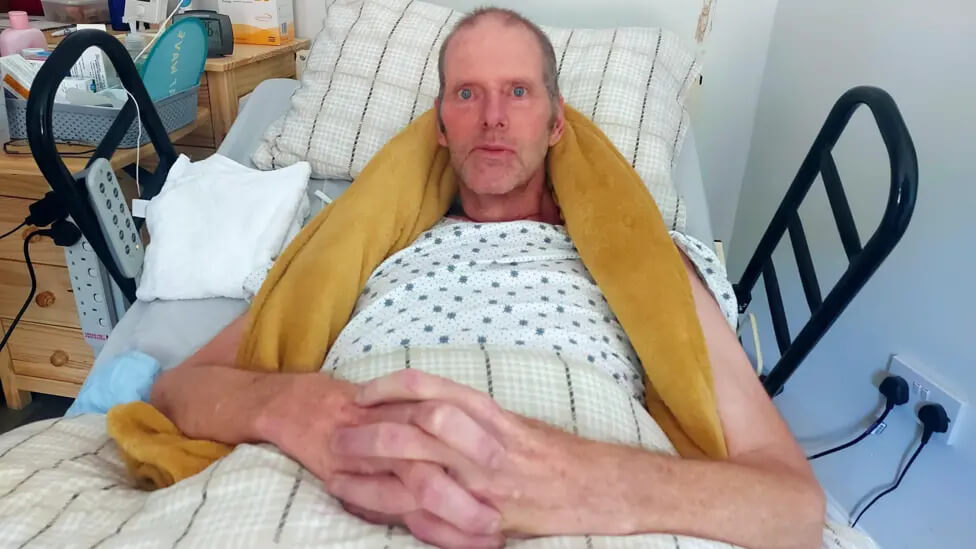A man struggling with declining health who feels abandoned by healthcare professionals has stopped taking life-saving medication, prompting fresh concerns about the dangers of inadequate NHS healthcare pushing patients towards assisted suicide if Kim Leadbeater’s Bill becomes law.
According to a BBC report, ,a man from Worcester, Tim Hull, 56, has decided to stop taking life-saving medication with the intention to hasten his death partly because he does not feel he is receiving the support he needs.
After stumbling whilst walking, Hull had to wait two years between 2022 and 2024 following communication breakdowns between medical departments before being diagnosed with a rare neurological condition, Hereditary Spastic Paraplegia (HSP), which causes spasms and muscle weakness and can cause pain, fatigue and depression. During this time, Hull lost the ability to walk.
Despite spending two months in hospital in 2024 regaining some mobility, he has heard nothing since, being told that he is on a waiting list for an assessment.
Tim’s situation has been made more challenging due to his height (6ft 10in), which has meant the two years he has spent in a standard NHS bed was “hideously uncomfortable”.
After finally receiving a larger bed, he was able to sit up but had a major choking incident during one mealtime, meaning he now mostly has meals in liquid form.
Hull told the BBC that the current health and care system “hasn’t worked. There’s no joined-up thinking. Nobody cares”. His sister Sue said “I just feel that he’s been completely abandoned”.
In February, Hull stopped taking medication that prevents his kidneys from failing, knowing this would likely lead to his death in the coming months. Hull said “I’d had enough of living the way I was. I couldn’t see myself getting any better and decided I didn’t want to be here anymore”.
“I don’t feel that things are going to get any better than this. I just feel [ending my life] would be a better option than lying in bed 24 hours a day”.
A number of commentators have shared their fears that cases like this may be worsened if the assisted suicide Bill becomes law.
Palliative care consultant Dr Jamilla Hussain said “This story genuinely made me feel sick – as I can think of many more people like Tim who do not have a life limiting illness but may choose [assisted suicide] or to withdraw treatment due to system and societal failures”.
Journalist Lucy Webster said “A disabled man has chosen to stop taking life-saving medication because it is too hard to get health and social care[.] This is the system we’re introducing assisted suicide into”.
“Broken” NHS in crisis
The BBC report added that Hull’s story was not uncommon, as over 250 people with serious disabilities or illnesses shared stories of “very long waits for assessments[and] appointments”, and “highlighted the frustrations of trying to get someone to signpost the right services, being passed from department to department, and the feeling that they were only listened to when they reached a crisis”. Professor Katherine Sleeman, a specialist in palliative care described Hull’s experience as “Utterly tragic. Utterly unjust. Utterly believable”.
The accounts come as palliative care services are in crisis, with Marie Curie reporting that 100,000 people are dying each year needing palliative care but not receiving it, and a wider healthcare system also in a state of crisis, with Health Secretary Wes Streeting describing the NHS as “broken”. Streeting is believed to be deeply concerned about the impact of assisted suicide on the NHS, saying “There isn’t a budget for this. Politics is about prioritising. It is a daily series of choices and trade-offs. I fear we’ve made the wrong one”.
He added “Even with the savings that might come from assisted dying if people take up the service – and it feels uncomfortable talking about savings in this context to be honest – setting up this service will also take time and money that is in short supply”.
Spokesperson for Right To Life UK, Catherine Robinson, said “Tim Hull’s sad experience is a stark reminder of what Alex Schadenberg, Executive Director of the Euthanasia Prevention Coalition in Canada, told parliamentarians in 2023: legalisation of euthanasia and assisted suicide is ‘a form of abandonment’ and, in most cases, these sorts of deaths are ‘deaths of despair'”.
“If the assisted suicide becomes law, someone like Tim Hull would likely be eligible to end his life under the terms of the Bill since he likely has fewer than six months to live. He is understandably struggling with his circumstances and what he needs is love and support, not assistance in suicide which is exactly what the Leadbeater Bill would offer”.
“The most vulnerable in our society deserve our unwavering protection and the highest standard of care, not a pathway to assisted suicide. Evidence from overseas shows that, if this legislation becomes law, countless vulnerable people nearing the end of life would be pressured or coerced into ending their lives”.












